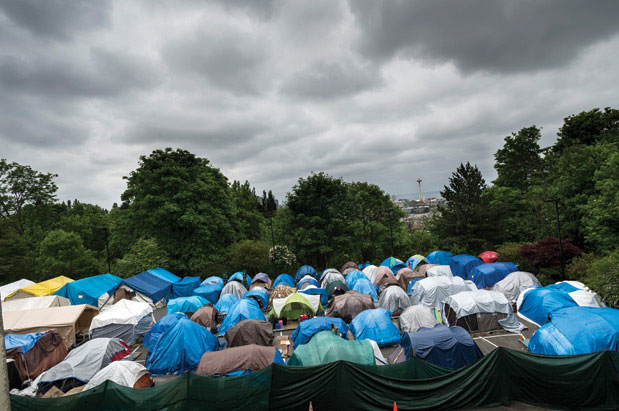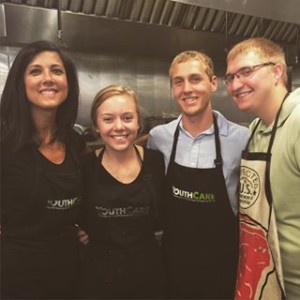November 14-22 marks National Hunger and Homelessness Awareness Week, an opportunity to reflect on the immense number of people in this country who do not have safe, affordable housing or reliable access to healthy meals – many of them diverse elders.

A tent city set up for homeless residents of Seattle, WA. Photo courtesy of Seattle Magazine.
The Diverse Elders Coalition and its member organizations promote and prioritize the health and well-being – especially as it relates to having a safe place to live and nutritious food to eat – of our communities of color, American Indian/Alaska Native communities, and LGBTQ communities. In our 2012 report “Securing Our Future: Advancing Economic Security for Diverse Elders,” we shared some shocking statistics about the economic insecurity of our communities, many of which still ring true today:
- Nearly 10 percent of AAPI (Asian American and Pacific Islanders) elders have incomes below the federal poverty threshold. When this data is disaggregated, we see that 33% of Hmong, 25% of Cambodian, and 15% or more of Laotian, Korean, Vietnamese, and Samoan elders living in the US have incomes below the threshold.
- One out of every six Hispanic elders (18%) live in poverty.
- While African American older adults make up only 9 percent of the elder population, they represent 21 percent of the elder population living in poverty.
- 24 percent of lesbians and 15 percent of gay and bisexual men have incomes below the federal poverty threshold. LGBT elders of color face the compounding effects of discrimination based on race, gender identity, and/or sexual orientation.
Additionally, a study conducted by the University of Kentucky Center for Poverty Research and Iowa State University reveals that relative to their representation in the overall older adult population, African Americans, Latinos, never-married elders, renters, and elders living in the South are more likely to be at risk of hunger.
Elders and families who are living in poverty are less likely to have adequate nutrition and access to safe, reliable housing. All of these alarming figures suggest that our communities are disproportionately impacted by hunger and homelessness.
So, what can we do about it?

Volunteers at a Seattle-area youth homeless shelter.
The Older Americans Act (OAA) is the country’s leading vehicle for delivering services and supports to older people nationwide. The OAA makes many services and supports for older adults available at low or no cost. Necessary services like home delivered meals, transportation, and benefits counseling all help older adults live in their homes and communities and age with dignity. However, despite the law’s successes and importance, it has yet to be reauthorized. Through events like NHCOA’s Capitol Hill Briefing and Advocacy Day, we are speaking with our congressional representatives and ensuring that the US government is meeting the needs of our diverse elder communities.
As individuals, we can also make a difference by advocating and volunteering. The National Coalition for the Homeless reminds us that we “can help to change the conversation about stereotypes, improve policy, help service providers, and so much more. As the basic act of obtaining a home becomes more difficult, the cry for action echoes louder than ever before.” I know that I will be out in my community this week – and every week – striking a blow against hunger and homelessness. Will you join me?
The opinions expressed in this article are those of the author and do not necessarily reflect those of the Diverse Elders Coalition.

